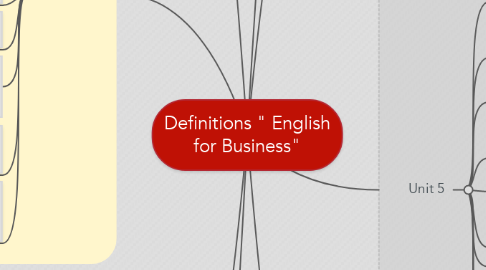Definitions " English for Business"
by HMS Al Otaiba

1. Unit 4
1.1. Acquisition: An asset or object bought or obtained, typically by a library or museum.
1.2. Collectivist: subscribing to the socialistic doctrine of ownership by the people collectively
1.3. Corporate Objective: realistic and measurable goals which an organization plans to achieve within a given period of time.
1.4. Diversity: a range of different things.
1.5. Glocalization: the practice of conducting business according to both local and global considerations.
1.6. Hierarchy: a system in which members of an organization or society are ranked according to relative status or authority.
1.7. Linear-active: Usually runs across the property various different landowners.
1.8. Logical: of or according to the rules of logic or formal argument.
1.9. Multinational: a company operating in several countries.
1.10. Stereotype: a widely held but fixed and oversimplified image or idea of a particular type of person or thing.
2. Unit 2
2.1. Bonuses: Something given, paid, or received above what is due or expected.
2.2. Esteem: To regard highly or favourably.
2.3. Hierarchy: A system of persons or things arranged in a graded order.
2.4. Motivation: A reason or reasons for acting or behaving in a particular way.
2.5. Perks: Become or make more cheerful, lively, or interesting.
2.6. Potential: Possible but not yet actual.
2.7. Repetitive: when someone repeats the same thing more than twice.
2.8. Satisfaction: Fulfilment of one's wishes, expectations, or needs, or the pleasure derived from this.
2.9. Theories: A supposition or a system of ideas intended to explain something.
2.10. wages: A fixed regular payment earned for work or services, typically paid on a daily or weekly basis.
3. Unit 1
3.1. Analysing: To examine in detail in order to discover meaning.
3.2. Colleages: A fellow worker or member of a staff.
3.3. Crisis: A crucial stage or turning point in the course of something.
3.4. Distributors: A person or thing that distributes.
3.5. Innovations: Something newly introduced, such as a new method or device.
3.6. Modify: To change the structure, character, intent.
3.7. Objectives: Something that one's efforts or actions are intended to attain or accomplish.
3.8. Profits: An advantageous gain or return.
3.9. Resources: Something that can be used for support or help.
3.10. Subordinates: A person under the authority or control of another within an organization.
4. Unit 3
4.1. Autonomous: Acting independently or having the freedom to do so.
4.2. Budget: An annual or other regular estimate of national revenue and expenditure put forward by the government, often including details of changes in taxation.
4.3. Cooperate: Assist someone or comply with their requests.
4.4. Factory: A building or group of buildings where goods are manufactured or assembled chiefly by machine.
4.5. Full Capacity: Fully occupying the available area or space.
4.6. Human Resources: The personnel of a business or organization, especially when regarded as a significant asset.
4.7. Merger: A combination of two things, especially companies, into one.
4.8. Organization: An organized body of people with a particular purpose, especially a business, society, association.
4.9. Permission: An official document giving authorisation.
4.10. Takeover: An act of assuming control of something, especially the buying out of one company by another.
5. Unit 5
5.1. Candidate: a person who applies for a job or is nominated for election.
5.2. Covering Letter: a letter sent with, and explaining the contents of, another document or a parcel of goods.
5.3. Headhunters: a recruiter of personnel (especially for corporations)
5.4. Job Interview: face to face conference which occurs so as to determine the suitability of the applicant for an employment position
5.5. Junior: low or lower in rank or status.
5.6. Psychology: the scientific study of the human mind and its functions, especially those affecting behaviour in a given context.
5.7. Quit: leve a place like home or job.
5.8. Referee: a person willing to testify in writing about the character or ability of someone
5.9. Senor: of a more advanced age.
5.10. Vacancy: an unoccupied position or job.
6. Unit 6
6.1. Accountability: the fact or condition of being accountable,
6.2. Appointed: (of a time or place) decided on beforehand; designated.
6.3. Consumer: a person who purchases goods and services for personal use.
6.4. Discrimination: recognition and understanding of the difference between one thing and another.
6.5. Gender: the state of being male or female.
6.6. Ratio: the quantitative relation between two amounts showing the number of times one value contains or is contained within the other.
6.7. Sacked: dismiss from employment.
6.8. Strategic: relating to the identification of long-term or overall aims and interests and the means of achieving them.
6.9. Society: the aggregate of people living together in a more or less ordered community.
6.10. Profit: a financial gain, especially the difference between the amount earned and the amount spent in buying, operating, or producing something.
7. Management and Leadership 1003
8. Done By Hamdan Bin Mana


